Uhh, yes they are, my company manufactures a variety of Li-ion battery components and I'm certified to ship batteries and other DG by ground and air. For example, straight from UPS (brown box):
View attachment 109508
As far as handling damaged cells is concerned, they're treated no differently, it's all Li-ion technology, in this case with polymer electrolyte instead of liquid. The basic chemistries (and associated hazards) are the same. In fact, the ubiquitous cylindrical cell, which contains liquid electrolyte, is both more common and potentially more dangerous in the event of failure. Anyway, all this is irrelevant, any facility that handles lithium batteries will be perfectly well equipped to handle LiPO cells.



